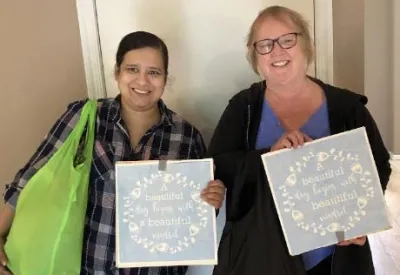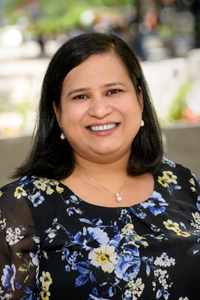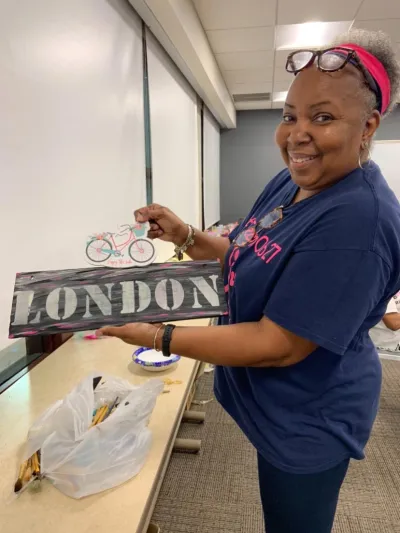
OTRs Create Community-Based Program for Women with Cancer
Colleen Maher and Rochelle Mendonca are OTRs from New Jersey who developed a community-based occupational therapy program that addresses the quality of life and well-being of women who have cancer.

Colleen Maher, OTD, OTR/L, CHT
Program Director & Associate Professor, Master of Occupational Therapy program, Saint Joseph’s University
Location: New Jersey
Certified in 1986

Rochelle Mendonca, PhD, OTR/L
Assistant Professor & Director of Doctoral Programs, Programs in Occupational Therapy, Department of Rehabilitation and Regenerative Medicine, Columbia University
Location: New Jersey
Certified in 2011
Filling the Gap
Dr. Colleen Maher and Dr. Rochelle Mendonca, both OTRs from New Jersey, recognized the multifaceted needs of women who have cancer, particularly those who live in underserved communities. After identifying the need for an innovative and evidence-based program to holistically address the needs of female cancer survivors, Dr. Maher and Dr. Mendonca developed Camp Discovery. Camp Discovery is a community-based occupational therapy (OT) program that helps women reengage in the community, develop support networks, and improve quality of life. The program has three main objectives: 1) to implement a one-week activity-based camp, 2) to provide physical, social, emotional, spiritual, educational, and psychosocial benefits, and 3) to improve quality of life through participation.

Creating Community
Since Camp Discovery’s inception in 2012, there have been 14 camps in urban, suburban, and rural areas that served 182 women of diverse backgrounds. Women participating in the camps build communities and relationships with each other, as well as engage in activities and occupations they may not have access to otherwise. Attendees participate in physical, emotional, spiritual, sensory, and educational activities, all with social and cognitive components. Participants stated that the camp has helped them engage in activities that they were scared of, improve their ability to perform meaningful occupations, and form communities and support systems with people who understand their struggles.
Although Camp Discovery was developed to be in person, it successfully pivoted to an online format during the COVID-19 pandemic. Supplies were ordered, packaged, and delivered to camp participants to ensure a continuity of services. This allowed Dr. Maher and Dr. Mendonca to continue meeting the needs of their clients, especially during a time of increased social isolation.
“Colleen and Rochelle made you feel so welcome that at the end of each day you’d forgotten that you are dealing with cancer. For an entire week you didn’t focus on your cancer, you had so much to keep you busy, that was the furthest thing from your mind. This camp was a life saver to me and my new friends. I look forward to attending Camp Discovery every year whether in-person or virtual. It’s always so much fun, regardless of your age. We need more programs like this for female cancer survivors, which are not available to us.”
Gloria Odom, 2x Cancer Survivor & Camp Discovery Attendee
Measured Outcomes
Two major goals of Camp Discovery were to provide women with cancer an opportunity to engage in activities and occupations that they may not have access to and to evaluate the effectiveness of the camp programming on health and quality of life. Since the start of Camp Discovery, Dr. Maher and Dr. Mendonca have evaluated* the impact of participation in the camp using the following participant characteristics and measurement tools:
- physical and mental health measured with the Short Form Health Survey (SF-36)
- quality of life measured with the World Health Organization Quality of Life (WHOQOL) questionnaire
- pain measured with the Brief Pain Inventory
- fatigue measured with the Brief Fatigue Inventory
- self-perception of occupational performance and satisfaction measured with the Canadian Occupational Performance Measure (COPM)
All measures were administered on the first day of camp, the last day of camp, and six weeks after camp to assess the short- and long-term impacts. Results showed significant differences in the mental health subscale of the SF-36, the social relationships subscale of the WHOQOL Brief Version, pain interference, fatigue interference, and performance and satisfaction measures of the COPM. The results of the evaluations described above indicated the camp had a significant impact on the participant characteristics.
*Certified OTRs and COTAs can read this study by searching for ID: 2001368449 on the ProQuest platform, which is available through your MyNBCOT account.

Mentoring Future Innovators
Dr. Maher and Dr. Mendonca have built a base of evidence that demonstrates the effectiveness of Camp Discovery for women with cancer, which can also be applied to different populations. They have published their results in peer-reviewed journals and presented extensively at national and international conferences.
Camp Discovery also recruits OT students who have a passion for serving the community. Students are trained in program development, budgeting, and creating and running group activities. They also use their own experiences and multilingual skills to build relationships with camp participants, which enhances the inclusivity of the camp and allows participants to feel a sense of belonging and accomplishment. This community of current and past OT students leave with the knowledge and skills to develop and implement similar community-based programs for other vulnerable populations.
Dr. Maher and Dr. Mendonca continue to be tireless advocates for women with cancer and the OT profession.
“As an Occupational Therapy student then, participating in this camp gave me the opportunity to put into practice what I had learned in OT school by modifying, adapting and implementing these activities to meet the needs of the women participating in the camp. It was such a rewarding experience to see how much the participants not only enjoyed participating in the camp but also re-discover themselves despite the many physical changes and challenges they had to endure when facing a cancer diagnosis and treatment.”
Paula A. Bradley, MOT, OTR/L